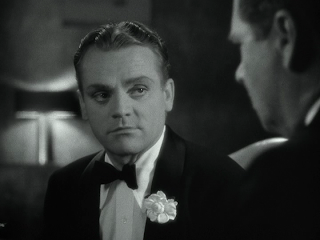 | |
| James Cagney |
Cagney’s film performances usually function on successive levels of nastiness, which in turn might vary from the immaculately composed to the terrifyingly vicious. While Mifune might be a rare example to the contrary, acting for cinema will remain a derivative of the theatre till the time (and only till the time) it is performed in a close-up. It is only in a close-up that an actor can act only for the cinema and not for any other medium. Now, cinema is an art not of replication, but of representation. It is the medium that at its informative best, can only evoke a notion of an object, but never of the object itself. As a director of cinema, one can only suggest a reality, but never really state it.
Great actors of cinema use their faces like gearboxes – graduating to higher levels of the same emotion, or reducing it to a tiny drawl to the point of obscurity. In close-ups, the status of a certain particular feature suggests which level of intensity (of the singular emotion) they are functioning at. Like De Niro uses the forehead better than anyone else (except, perhaps, Tony Leung), and the way Leaud’s hair falls onto his head will tell you how messed up his character truly is in the event of that scene – most of Cagney’s acting is done through the lower half of his face, with eyes featuring sometimes as backing vocals.
His is the machismo not of the brash temperamental egoist that people fear, or of the invincible war machine that people just cannot compete with, but of the most supreme kind, that of the ‘kung-fu master’; of the Yoda-type, the old sage whose wisdom everyone can benefit from, but they do not have the foresight to. Unlike a lot of his descendants (Malcolm McDowell or Joe Pesci, actors compared to him often), he is not impatient or abrasive. The characters he plays have grown up on the streets, and thus, can lay a successful claim to exclusive wisdom. One of the rules that the acquired wisdom dictates is that Cagney’s character will never instigate – or initiate a conflict. He will infact exhibit remarkable reserve and composure, even in the face of unwitting incitement. Much like the kung-fu master, he will not lose his calm if the pupil commits stupid errors; rather, he will merely smirk wryly – the luxury of a person who knows better. This is the second gear, the infant stages of the Cagney nastiness.
 | |||||
| The Cagney Smirks |
Cagney will hope, however, that his patience is not mistaken for coyness. He will not stamp his authority, but he will not allow a violation of it either. It is at the very instant – the unfortunate instant – in which he will realize that he is being taken for a fool, that he will shift to a higher gear, the penultimate level of nastiness. Once he reaches this stage, he will doubtlessly proceed to the next. ‘The revelation’, as one may call it, lasts only for a mini-second, and is akin to the moment when the pin of the grenade is removed. The instant features in the various levels of nastiness, but it is only during this very instant when Cagney realizes that he has been short-changed that he is not nasty. He is distraught and heartbroken. The tragedy of a man who is let down by the world repeatedly.
And then, finally, Cagney reveals his filthy soul. He gets really nasty.
The only reason White Heat might be the greatest Cagney performance is because in that, people who surround him constantly challenge the authority of his wisdom, and such blatant encroachment of his exclusive position means that Cagney’s pin is removed throughout the film.










No comments:
Post a Comment